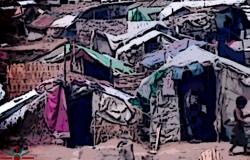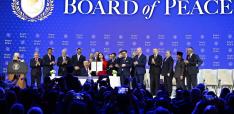GP Blogosphere Round-Up: The Rohingya Crisis

The Rohingya Crisis is an eerie reminder that there is still room for genocide in the world we live in today. According to the latest UN reports, approximately 370,000 Rohingya have fled into Bangladesh and an unknown number have perished. Whilst religion and ethnic conflicts lie at the crux of the issue, below is a compilation of blog pieces that suggest that there are several factors involved in the escalation of this human catastrophe. In what follows, Global Policy's intern Surya Varatharajan rounds up some of the best online commentary and analysis of the developing crisis.
The Dark Cresent, A Modern Genocide by Alicia de la Cour Venning
Proclaimed as “detestable human fleas”, the Rohingya population have been disdained by the Buddhist nationalists who do not wish for the ethnic minority to live and cultivate in “their” land. Despite the Rohingya occupying the area since the 12th Century and Myanmar being a multi-religious country with no official state religion, the government has officially backed the rhetoric of the Theravada Buddhists, who pertain 88% of the majority. Understanding that this would irk discontentment from foreign powers and bodies such as the UN, the Myanmar government is keen to maintain and satisfy the business interests of neighbouring powers such as China and Russia to secure a buffer against the Western influence.
Highlights:
‘Modern genocide is a form of social engineering, and often a long-term process. It begins not with mass murder, but with the dehumanisation, isolation, and systematic weakening of a target group.’
“We openly declare that absolutely, our country has no Rohingya race,” - Aung Hlaing, Myanmar’s defence commander-in-chief
“we are negotiating with some friendly countries not to take it to the security council. China is our friend and we have a similar friendly relationship with Russia, so it will not be possible for that issue to go forward”. - Thaung Tun, Myanmar’s national security adviser
Regional Powers by Matteo Fumagalli
The Chinese and Indian governments defend their position by suggesting that the Rohingya have connections to terrorist organisations. Therefore, they see the mass deportation of the ethnic group as a justified response to a security threat. It is interesting to note that India, being a secular country celebrated for its religious diversity, has supported the persecution of the Rohingya. However, India has given refuge to 40,000 members of the community. Whilst the commune expresses its gratitude, the legal representatives of the Rohingya state quite clearly that India needs to officially condemn the Myanmar government and renounce its support. Correspondingly, an appeal has been lodged against Prime Minister Modi and his Hindu Nationalist government for its deportation plan and silence against the Myanmar government’s military offensive. Citing that foreign intervention is futile, China has opposed the demands of western powers such as France and Britain to solve the Rohingya Crisis at the UN Security Council meeting.
Highlights:
‘Both New Delhi and Beijing have firmly embraced the official narrative of Myanmar’s government. Likewise, Russia is also keen on sheltering Myanmar from any international sanctions.’
‘Aung San Suu Kyi’s long-time supporters dismayed was the ease with which, facing the prospect of censure by the UN, she warned off critics, indicating that she would turn to Russia and China’s veto power, if needed.
‘The US is uninterested in Myanmar. President Trump has no time with other priorities at hand, from North Korea’s nuclear threat to its evolving relations with China.’
The EU by Ludovica Marchi
Having recognised the conflict since 1994, the ECHO, the European Union’s humanitarian aid department has assisted the Rohingya by funding relief programmes in Rakhine State and in the Cox’s Bazar District of Bangladesh. It has also financially helped the International Organisation for Migration in the retrieval of 3,000 Rohingya men, women and children who were detained in Thailand after being accused of alleged illegal entry. In addition to the monetary support, the EU has also called for the Myanmar government as well as the Rakhine State authorities to take measures such as registering all children at birth to ensure the inclusion of the Rohingya in Myanmar’s society.
Highlights:
“Together with lifting sanctions, the EU has played a significant role in contributing to development aid, technical cooperation and training, trade under the ‘Everything but Arms’ facility, and supervision of the Nationwide Ceasefire Agreement.”
‘It stressed its demand that the government should reform the Citizenship Law, and offer citizenship to the Rohingya minority.’ – interpolated from the EU’s resolution on the situation regarding the Rohingya minority in Myanmar.
‘The European Commission devolved its support by donating €2 million in aid to Myanmar and Bangladesh jointly, and increased its support for Bangladesh with another €3 million donation.’
What can be done? by Joshua Kurlantzick
It is essential that the Super Powers relinquish any support for the Myanmar government. Reportedly, the American Senate’s defence authorization bill consisted of rhetoric that permitted the expansion of military relations between the U.S. and Myanmar. However, Senator John McCain, who chaired the armed services committee, stated that such language will be erased from the bill effective immediately. Moreover, the enabling of journalists to work in the Rakhine State is key to facilitate a better understanding of the issue to the common public in foreign nations as this will increase the domestic pressure on foreign leaders to resolve the issue. Finally, it is imperative to increase the pressure on the Commander-in-Chief Sen. General Min Aung Hlaing, as he possess "the right to take over and exercise State sovereign power" and even if Aung San Suu Kyi wishes to stop the offensives against the Rohingya, General Hlaing will not allow her to do so, hence quelling his power is necessary to bring an end to the crisis.
Takeaways
The persecution of the Rohingya minority suggests that divisive politics is, once again, gaining prevalence throughout the world. Governments may often proclaim that they are secular and multi religious states that are simply responding to security threats, but it can often be seen from their policies that they are permeated by exclusivist religious and racial attitudes. It therefore remains of great importance for foreign powers and international bodies to publicly condone actions such as those of the Myanmar government and to work together to resolve issues that undermine the fundamentals of human liberty.
Surya Varatharajan is a research intern for Global Policy and a 3rd year Philosophy, Politics and Economics student at Durham University. With an avid interest for political thought and international policy, Surya has conducted independent research within the areas of security, development and ideology in international relations during his time at Durham.
Image credit: AK Rockefeller via Flickr (CC BY-SA 2.0)


